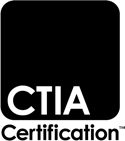Battery Compliance Certification
The CTIA Certification program for battery compliance sets the industry standard for the quality and reliability of mobile device batteries. It helps device operators and their suppliers to validate lithium ion batteries’ compliance with the IEEE Standard for Rechargeable Batteries for Cellular Telephones (IEEE Std 1725™) and the IEEE Standard for Rechargeable Batteries for Multi-Cell Mobile Computing Devices (IEEE Std 1625™).
The Certification Process
Request
Manufacturer submits a request for certification through the CTIA Certification database.
Identify
Manufacturer identifies the system components, including the device and its recognized packs and adapters.
Select
Manufacturer selects a test lab.
Test
Test lab conducts testing and submits test results to the certification database.
Submit
Manufacturer submits required documentation to the certification database.
Pay
Manufacturer pays lab for testing and CTIA for certification.
Confirm
CTIA Certification ensures that all requirements have been met.
Notify
Certification notice is issued to the manufacturer.
Request
Manufacturer submits a request for recognition through the CTIA Certification database.
Identify
Manufacturer identifies authorized sites where the cell is manufactured.
Select
Manufacturer selects a test lab.
Test
Test lab conducts testing and submits test results to the certification database.
Submit
Manufacturer submits required documentation to the certification database.
Pay
Manufacturer pays lab for testing and CTIA for recognition.
Confirm
CTIA Certification ensures that all requirements have been met.
Notify
Recognition notice is issued to the manufacturer.
Request
Manufacturer submits a request for recognition through the CTIA Certification database.
Identify
Manufacturer identifies recognized cells used in the battery pack.
Select
Manufacturer selects a test lab.
Test
Test lab conducts testing and submits test results to the certification database.
Submit
Manufacturer submits required documentation to the certification database.
Pay
Manufacturer pays lab for testing and CTIA for recognition.
Confirm
CTIA Certification ensures that all requirements have been met.
Notify
Recognition notice is issued to the manufacturer.
Request
Manufacturer submits a request for recognition through the CTIA Certification database.
Select
Manufacturer selects a test lab.
Test
Test lab conducts testing and submits test results to the certification database.
Submit
Manufacturer submits required documentation to the certification database.
Pay
Manufacturer pays lab for testing and CTIA for recognition.
Confirm
CTIA Certification ensures that all requirements have been met.
Notify
Recognition notice is issued to the manufacturer.
Battery Compliance Certification FAQs
Here are answers to common questions about our Battery Compliance Certification Program. If you have questions that we have not answered, please submit a question or contact us.
The program consists of the following elements:
- Battery cell manufacturing site authorization based on on-site audit and analysis by a CTIA Certification Authorized Test Lab (ATL) of management controls, process controls, quality systems, and technical competence;
- Battery cell product recognition based on testing and analysis by an ATL, and cell vendor declaration of compliance;
- Battery pack product recognition based on testing and analysis by an ATL, and pack vendor declaration of compliance;
- Adapter product recognition or certification based on testing and analysis by an ATL, and adapter vendor declaration of compliance;
- System certification based on use of recognized subsystems, System test and analysis by an ATL, and a System Vendor declaration of compliance
The standards establish criteria for the quality and reliability of rechargeable lithium-ion batteries used in mobile devices. They include design, manufacturing and validation guidelines encompassing the entire charging system including the battery pack, the cells inside the pack, the power adapter and the mobile device itself.
IEEE first created the 1625 standard for multi-cell batteries for notebook computers. Seeing the success of this standard, CTIA asked IEEE to create the 1725 standard for single-cell batteries for cellphones. A working group was formed with industry leaders in cell, battery pack, and systems management. Once created and published, CTIA formed its working group to develop and implement a certification process to verify compliance to both standards.
Smartphones, feature phones, tablets, notebooks and power banks.
There is no fee for battery system certification.
There is a fee for subsystem recognition and adapter certification, however. The fees are:
- $2,500 for Cell, Pack or Hybrid – Initial recognition
- $2,500 for Adapter – Initial recognition
- $750 for Adapter – Initial recognition
- $0 for Cell, Pack or Adapter – ECO recognition
These fees are separate from fees charged by the CTIA Certification Authorized Test Lab (ATL) to evaluate system or subsystem compliance.
Please reference the Policies and Procedures for CTIA Certification Authorized Test Labs.
Certification requests can be submitted online here.
Authorized Battery Compliance Certification Test Labs
There are numerous CTIA Certification Authorized Test Labs (ATLs) throughout the world. Find one near you.
Working Groups
CTIA Certification working groups are the foundation of our certification programs. This global network of operators, service providers, device manufacturers, test labs, and many others, solve industry challenges, enable new efficiencies, and hold the wireless industry to the highest standard.
